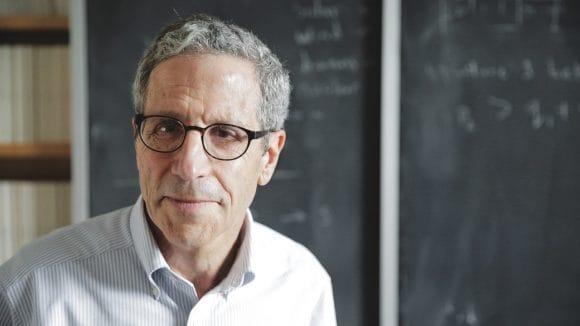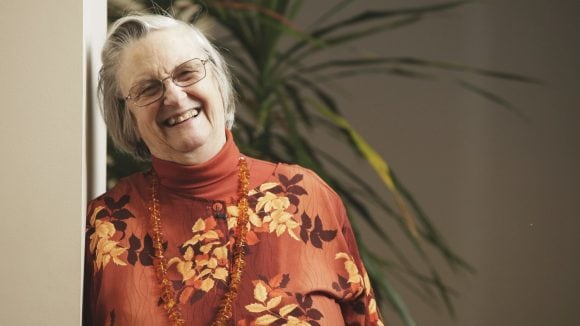Being acknowledged as one of greatest minds of the 20th century didn’t stop Franco Modigliani from challenging his friends and visitors in a sporting fashion - every encounter started with a friendly tennis game. A nice opening to far more complex matters because, with Modigliani, things never stayed on the peripheries. “I am interested in all current situations and the problems that are coming out of it,” said Modigliani. “I have had a long interest in the foreign trade deficit and in the European performance.” Contrasting with the standard view that a deficit in the economy will lead to an increase in later taxes, Modigliani’s argument was that the deficit causes displacement of capital, a clear illustration of his own eccentric style in the field of economics.

Franco Modigliani
Franco Modigliani
The Sveriges Riksbank Prize in Economic Sciences in Memory of Alfred Nobel, 1985
Understanding the dynamics of trade deficits: Modigliani's insights into open economies and capital scarcity
Understanding the dynamics of trade deficits: Modigliani's insights into open economies and capital scarcity
Modigliani explained the “new phenomenon” as an open economy running a trade deficit that could preserve its investments because the scarcity of capital drives up interest rates and attracts capital from abroad. This would mean foreign savings would partly finance national investments.
“There’s an enormous shift of resources away from export and import competing goods and into other sectors,” he said. “This, accompanied by an appreciation of the dollar, has led to a sharp decrease in exports and a strong increase in our imports.”
“People don’t understand this enormous deficit,” he said. “They think it’s due to Japan or Germany, that they are taking advantages of the United States and that this is something unfair. They don’t understand that this is due to US policy.”
Has this question inspired you?
Get the latest Nobel perspectives delivered to you.
Why did Modigliani believe that "linked models" were important for Europe's future in the world economy?
Why did Modigliani believe that "linked models" were important for Europe's future in the world economy?
Back in 1987, Modigliani already knew that Europe needed investment. “It especially needs to stimulate the economy in a form that encourages the creation of more labor places,” he said.
An Italian by birth, Modigliani was very concerned about the future role of Europe in the world economy and often suggested “linked models” were needed to improve international relations. If foreign trade picked up, the demand for US goods would increase. The central bank and the government would need more resources to feed the export industry and the only way they could do it is by increasing taxes and by increasing expenditure. According to Modigliani, this in return would decrease the trade deficit.
What is Franco Modigliani’s Life-Cycle Hypothesis?
What is Franco Modigliani’s Life-Cycle Hypothesis?
Modigliani’s saving function method overthrew the widely held belief that consumption and savings depend on current income. The Life-Cycle Hypothesis provided a fresh perspective by putting forward the idea that people tend to choose a level of consumption they can maintain over the course of their lifetimes. Modigliani’s research had great implications for policy measures. “Bequest-saving will respond to taxation,” he said. “Whereas lifecycle-saving will respond to things like social security.”
What we need to understand about our savings behavior
The other fundamental implication of his lifecycle model reflects the behavior of countries and their saving patterns. “A country’s saving depends primarily on the rate of growth of the economy,” Modigliani said. “If the economy has no growth, no matter how rich it is, it will not save. Reversely, if the economy grows, no matter how poor the country is, it will save.” He used China as an example because in the 1980s, it had grown faster than any other country and had increased its savings substantially.
The Modigliani-Miller Theorem: How debt and equity financing affects a firm’s value
The Modigliani-Miller Theorem: How debt and equity financing affects a firm’s value
It used to be thought that financing firms with debt rather than with equity was beneficial, as interest rates were typically lower than the cost of equity. The famous Modigliani theorem discredited this. “If there are no taxes, then it should not make any difference how a firm is financed,” he said. His findings started a new movement in the global financial economy by proving that there existed mechanisms that would maintain a firm's level of risk and value, regardless of financing.
Modigliani and Miller's Breakthrough in the valuation of firms
The Modigliani-Miller theorem led to an incredible amount of work in the field of financial economics, contributing to the calculation and evaluation of risk and the valuation of firms. “This turned out to be a very big advancement because profits are an undefined concept when you are dealing with uncertainty,” he said. “But the market value of a company is solid.”
A Nobel Prize-winning economist who worried about the state of the world
A Nobel Prize-winning economist who worried about the state of the world
While his work contributed to and improved the welfare of people in several countries, the state of the world worried him in the summer of 1987.
“Perhaps now, more than ever, we do face some serious problems,” he said. “Some are economic, some are environmental problems, and some are problems of peace and war.” Modigliani defined conflicts that have remained after his death and with his rational expectation theory, he countered the perception that we’re less able to forecast what will happen in the future.
“There are expectations to the future such that if you hold them and act accordingly that will make the future be what you expect,” he said. “Make it consistent.”
Are we able to forecast our conflicts?
Has this question inspired you?
Get the latest Nobel perspectives delivered to you.
Why do countries have to find better ways to grow?
Hear Michael Spence's view on how countries can grow sustainably while having a long-lasting positive impact.
What does Modigliani’s work mean for us?
People Also Asked
More Nobel Laureate stories
Has this question inspired you?
Get the latest Nobel Perspectives updates delivered to you.



